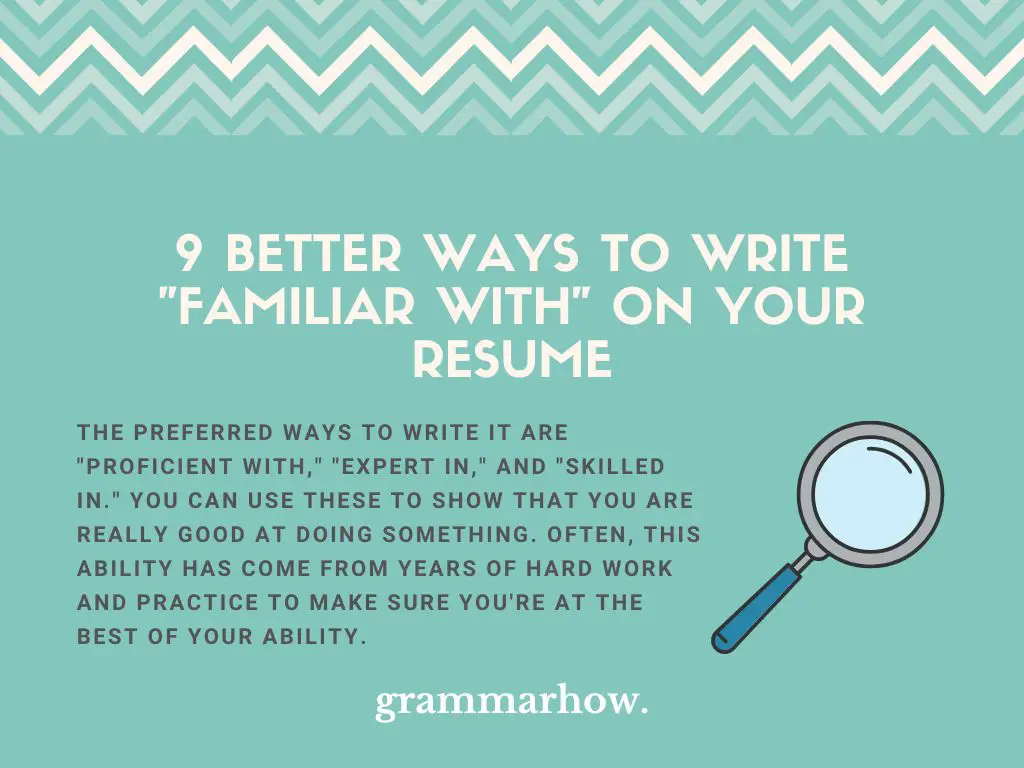
It’s good to show that you’re “familiar with” things in your resume. It helps you to establish your interests and skills early on, which will help an employer to know whether you’re worth hiring. This article will explore some of the best ways to write “familiar with” in your CV.

The preferred ways to write it are “proficient with,” “expert in,” and “skilled in.” You can use these to show that you are really good at doing something. Often, this ability has come from years of hard work and practice to make sure you’re at the best of your ability.
“Proficient with” is one of the best alternatives to using “familiar with.” “Proficient with” is always going to be encouraged because it shows that you have a great deal of understanding relating to a specific field or subject that you might be applying for.
Employers love proficiency. If they can see that you’re clearly well-versed in something that your job role might require, they are going to look at you in a much more positive light.
Making sure you highlight your proficiencies early is going to be the best thing you can do. It will help you to show the employer that you’re ready to demonstrate your knowledge and put it into practice for your new job.
“Expert in” is a very confident way of showing that you’ve spent a lot of time practicing something. Some people think it’s a bit overly confident since you need to be certain of your own abilities before you can use a word like “expert.”
However, if you are sincere about your expertise, it might work well. If you know that you’ve worked hard to be where you are and you’ve done a good job of getting to that point, then being an “expert” is a helpful way of showing that you are going to be a worthy hire for your employer.
“Skilled in” is a good way of showing someone where your skills come from. It works really well in a CV because it shows that you’ve dedicated time to something to make sure you have the relevant “skills” to do it correctly.
You can use this one to impress a potential employer by sharing your skills. It helps when you’re trying to show them what you’re capable of without coming across as too arrogant.
“Comfortable with” is a good way of showing that you are able to handle yourself in certain situations. “Comfortable” isn’t the most confident word to use, which is why it doesn’t rank higher. Still, it’s a good choice that can fit in many CVs.
Some people might think that “comfortable with” sounds a bit insincere. It might show that you’re not all that confident in your own abilities because you’re not using more confident words like “skilled” or “expert.”
“Capable of” lets a potential employer know what you can do. “Capable” is a good way of showing someone that you’re able to do something that relates to the job you’re applying for. It allows them to see what you think about your own abilities.
It’s good to know what you are capable of. Many people aren’t aware of their own capacity, or they might sell themselves short when they’re writing a CV. If you can be honest about the things you can do, you’ll find that this one works well in many situations.
“Practiced in” works well because it shows that you’ve taken time to “practice” certain things. It gives you a chance to show that you’ve spent years learning about certain areas, which can usually help you to understand more about your job.
The old saying is “practice makes perfect.” Employers are looking for someone who can be honest and show that they are “practicing” areas rather than outright saying they have “perfected” them in any way.
“Knowledgeable about” shows that you have a lot of knowledge without saying that you’ve mastered something. It works well because it shows that you’ve spent time studying something, but you know there are still gaps in your knowledge that you can fill.
It’s helpful to use a term like this in your resume because it shows that you’re still open to learning new ideas. It’s always encouraged to try and use this when you’re writing your best qualities.
“Experienced in” relates to your experience with a certain topic or subject. “Experience” is something that all employers look for. Most CVs and resumes are just ways for you to list all of your experiences, so this phrase can work well to show them off.
The only issue might be that the “experience” side of things should already be clear. It might be seen as a bit of a redundancy if you use “experienced” to talk about “experience.”
“Seasoned in” shows that you’ve spent a lot of time learning about something. When someone is “seasoned,” it means they have spent time making sure they are at the best of their ability in the relative field.
Being “seasoned” is a lot like being “experienced.” Some people prefer to use it because it removes the redundant reuse of “experience.” “Seasoned” might come across as a little bit more informal, though.
Martin holds a Master’s degree in Finance and International Business. He has six years of experience in professional communication with clients, executives, and colleagues. Furthermore, he has teaching experience from Aarhus University. Martin has been featured as an expert in communication and teaching on Forbes and Shopify. Read more about Martin here.